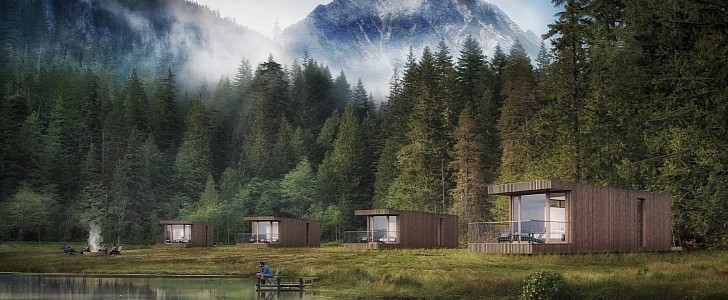New York-based company Moliving wants to reinvent the hospitality industry by offering a modular and mobile hotel concept that can be relocated from one area to another, to adapt to changing trends and traveler demand.
Moliving describes itself as a nomadic hospitality solution. Its mobile units are basically like portable, tiny homes that can pop up anytime and anywhere needed. They are 45 ft (13.7 m) long, offer around 400 sq ft (37 sq m) of interior space, and come with all the luxury and benefits of a traditional five-star hotel.
With earthy tones and a spa-inspired bathroom with a large skylight, the units feature an open floor plan that offers distinct areas for living, working, and sleeping. Some of the amenities are a smart TV, a wireless speaker, USB ports, a private bar, electronically-controlled shades, and WiFi.
They are custom designed depending on the customer’s needs, based on the location where they have to be transported and they take around three to five months to be built, assembled, and installed. This way a hotel can be launched in a matter of months, instead of years, as it happens when following the traditional route.
Moliving has the units constructed off-site and they are transported to their destination once they are done, via road or sea.
All the hotel rooms come with off-grid capabilities and have solar panels mounted on the roof. They can be self-sufficient with the use of holding tanks and lithium battery technology that stores the energy harvested from the panels, as explained by Moliving. Each unit also has gray water recycling technology incorporated so that guests reduce the consumption of freshwater.
The biggest advantage offered by Moliving is flexibility. Its mobile units can easily be moved from one location to another with minimal impact. For instance, if demand in a certain area decreases, the hotel can be easily relocated to achieve peak occupancy year-round.
With earthy tones and a spa-inspired bathroom with a large skylight, the units feature an open floor plan that offers distinct areas for living, working, and sleeping. Some of the amenities are a smart TV, a wireless speaker, USB ports, a private bar, electronically-controlled shades, and WiFi.
They are custom designed depending on the customer’s needs, based on the location where they have to be transported and they take around three to five months to be built, assembled, and installed. This way a hotel can be launched in a matter of months, instead of years, as it happens when following the traditional route.
Moliving has the units constructed off-site and they are transported to their destination once they are done, via road or sea.
All the hotel rooms come with off-grid capabilities and have solar panels mounted on the roof. They can be self-sufficient with the use of holding tanks and lithium battery technology that stores the energy harvested from the panels, as explained by Moliving. Each unit also has gray water recycling technology incorporated so that guests reduce the consumption of freshwater.
The biggest advantage offered by Moliving is flexibility. Its mobile units can easily be moved from one location to another with minimal impact. For instance, if demand in a certain area decreases, the hotel can be easily relocated to achieve peak occupancy year-round.






